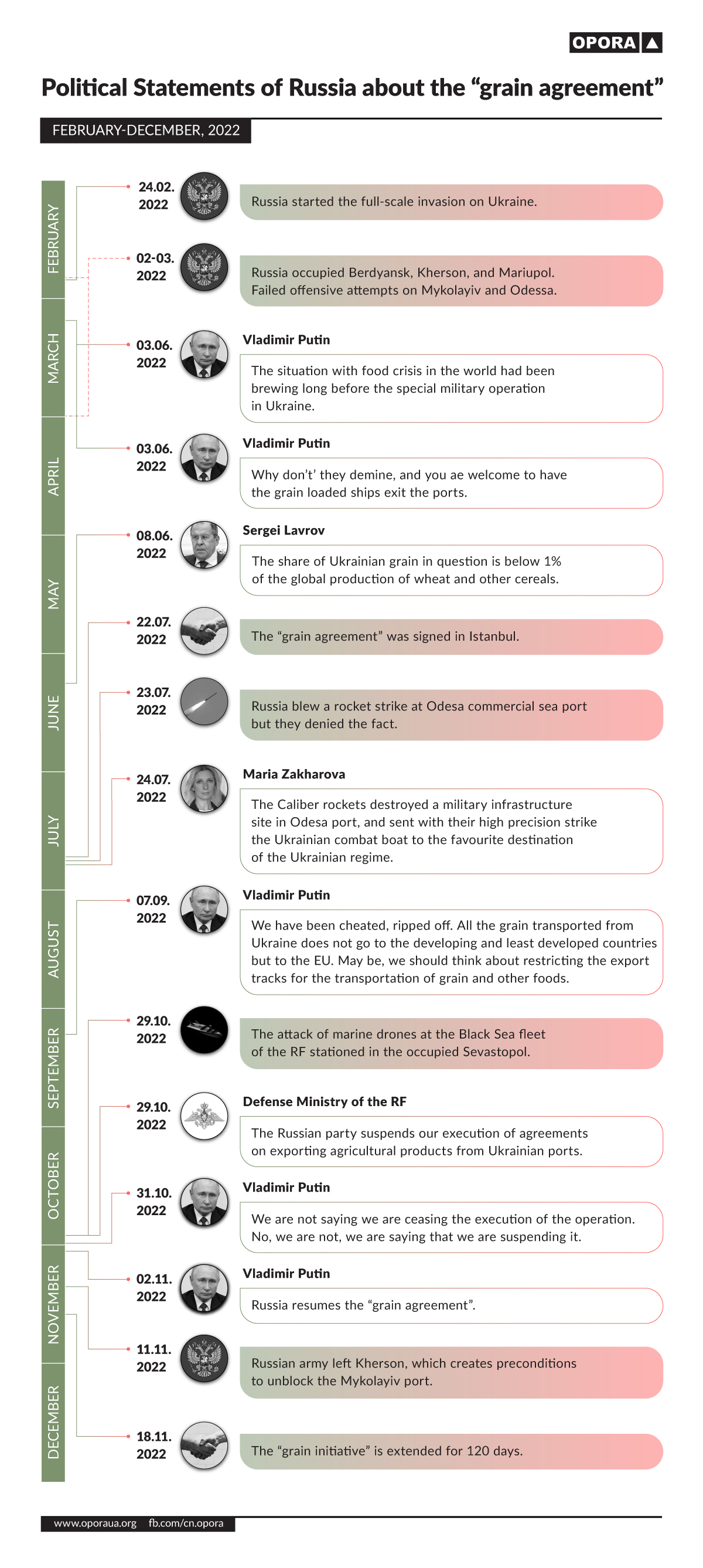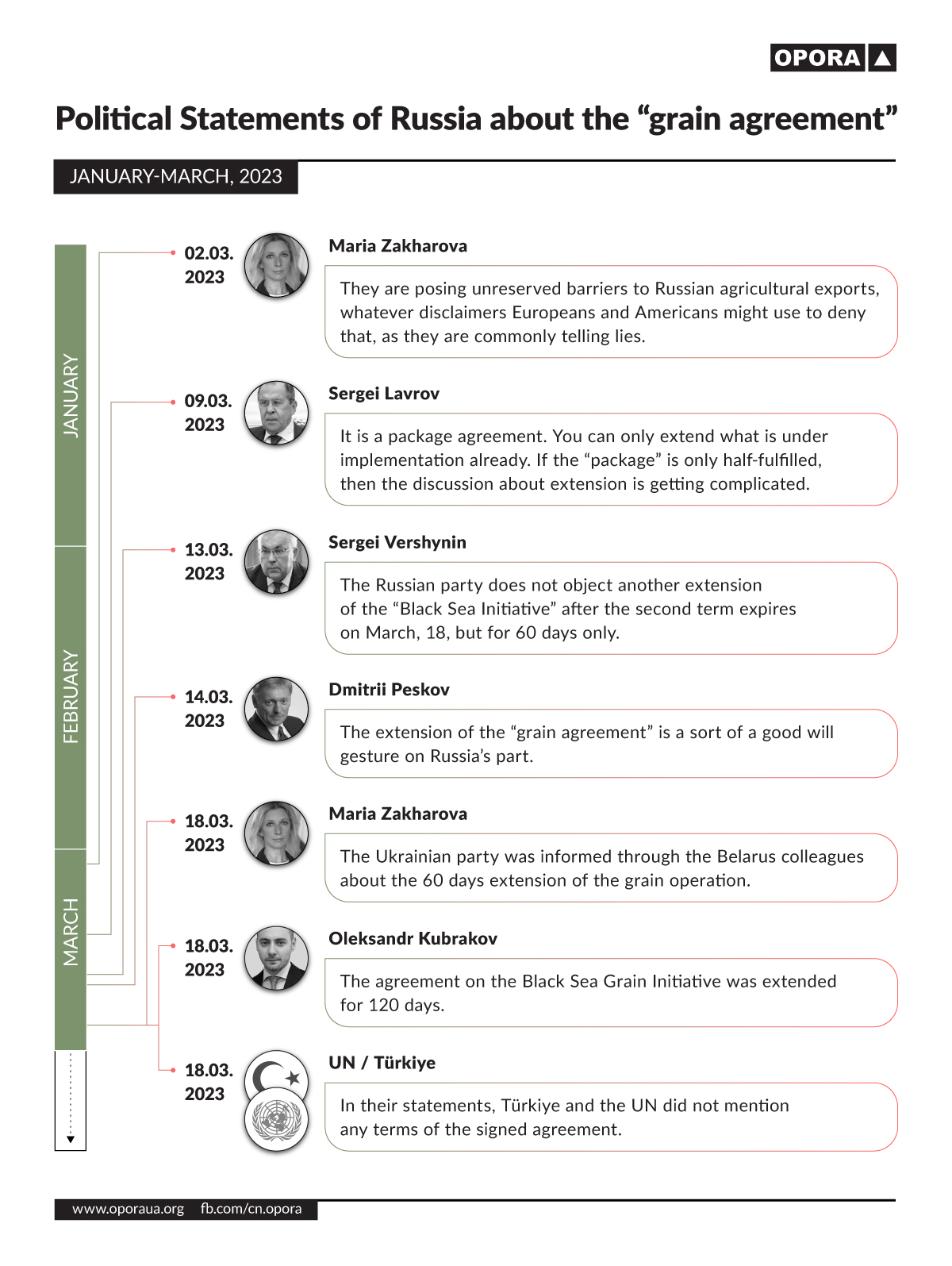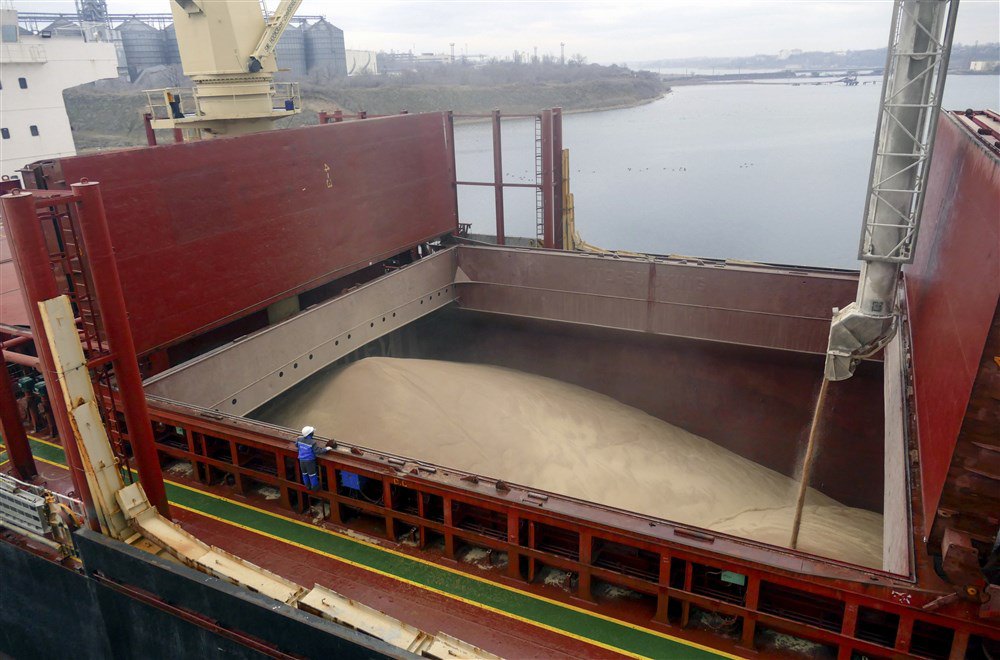The full-scale invasion of Russia provoked a food crisis in the world. Because of defeats at the front and the failure to seize Ukraine, the aggressor resorted to grain blackmail in order to weaken Western sanctions. The tool of this strategy was the Black Sea Initiative on the export of Ukrainian grain, which extension Russia uses every time to lobby their interests.
Russia's sabotage of the grain deal reduced Ukrainian exports by almost half, which does not contribute to food stability in the world. Instead, Russia shifts responsibility for the crisis to Ukraine, which has fallen victim to its aggression, and to the Western powers, which have imposed sanctions on Russia.
Read below about the development of the food crisis caused by the Russian invasion.
Russia Blackmails the World With Grain Deal Terms to Ease Sanctions
On March, 18, Ukraine, Russia, Turkey, and the UN extended the Black Sea Food Initiative for the safe exports of Ukrainian food. The extension period remains unclear due to Russian actions: Ukraine says that the agreement had been extended for 120 days, and Russia claims it is only 60. At the same time, Turkey and the UN do not specify any deadlines at all.
Photo: Umut Çolak /Wiki
Signing of the Black Sea Grain Initiative in Istanbul, in the presence of Turkish President Recep Tayyip Erdogan, UN Secretary General Antonio Guterres, Ukrainian Minister of Infrastructure Oleksandr Kubrakov, and Russian Defense Minister Sergei Shoigu, in 2022.
Earlier, Ukraine expected to extend the agreement for a year and include Mykolaiv ports, but Russia was trying their utmost to disrupt Ukrainian plans. For example, at first they tried to negotiate a partial lifting of sanctions. The Kremlin wanted to agree on the re-connection of Rosselkhozbank to SWIFT, the resumption of the supply of agricultural machinery and spare parts to the Russian Federation, the lifting of restrictions on insurance and access to ports for Russian ships and cargo, as well as the unblocking of accounts and financial activities of Russian fertilizer producers.
Later, the aggressor raised the stakes, declaring its readiness to extend the initiative for 60 days only. This is contrary to the document signed by Turkey and the UN — the agreement on the Black Sea grain initiative provides for an extension of at least 120 days.
Due to the reduction in the duration of the agreement, the aggressor is trying to further complicate the planning of grain exports from Ukraine, which may adversely affect the revenue to our national budget. Volodymyr Slavinsky, deputy general director of the Nibulon agricultural company, explained that Russia's actions could disrupt the logistics chain. Besides, due to the delay in inspections of ships, buyers of Ukrainian products can refuse the goods, and Ukrainian exporters would have to sell them at lower prices.
Also, the aggressor constantly shelled the port of Ochakiv in the Mykolaiv region to make sure it is not included in the initiative. The defense forces in the south of Ukraine explained that the port of Ochakiv was the place of distribution of ship traffic and the interchange of international transport routes. That is why the Russians systematically terrorize the location.
Photo courtesy of the State Emergency Service of Ukraine. Consequences of the shelling of the port in Ochakiv.
In addition, Russian politicians unanimously stated that the grain agreement was a package for the Ukrainian and Russian sides, but in practice only Ukrainian conditions were allegedly fulfilled. Besides, they say that the Memorandum between Russia and the UN on the promotion of Russian food on world markets is allegedly blocked.
The Kremlin claims that the interests of Russian agricultural producers are not taken into account, Russian fertilizers remain blocked in European ports, and the operation of the Tolyatti-Odessa ammonia pipeline has not been resumed.
At the same time, Kremlin spokesman, Dmitry Peskov, called the extension of the agreement a gesture of goodwill on the part of Russia. However, as you know, the words of the Russians often do not coincide with reality.
Thus, according to Bloomberg, the export of Russian wheat has almost doubled compared to the pre-war period. Hundreds of thousands of tons of Russian fertilizers remain frozen in European ports, but exporters manage to ship a huge amount of grain.
On March, 14, during a visit to the Ulan-Ude Aviation Plant, Vladimir Putin boasted that Russia had harvested a record 155 million tons of grain over the past year. We can assume that this result was achieved at the expense of Ukrainian grain from the occupied territories.
Also, Moscow freely uses its Black Sea ports, and Russian ships do not pass any inspections in the Bosphorus. Russia can use these circumstances to receive military cargo and continue the war against Ukraine.
Photo by Naval News. The Russian cargo ship Sparta-4, which is under US sanctions, crossed the Bosphorus and entered the Black Sea, heading from Syria to Novorossiysk.
Such concerns were expressed in a joint statement by Ukrainian Foreign Minister, Dmytro Kuleba, and Minister of Infrastructure, Oleksandr Kubrakov. For example, in March, the Russian cargo ship Sparta-4 carrying a military cargo crossed the Bosphorus and entered the Black Sea, heading from Syria to the port of Novorossiysk.
Instead, the Kremlin's interest in ammonia exports may be driven not by fertilizer prices, but by excess production capacity. Analyst at Barva Invest, Konstantin Kinzhalov, explained that Russia needs sales so that production does not stand still, and people have a job and a salary.
However, Russian gamesmanship for the sake of imaginary victories can cost the world too much. According to the UN, the Black Sea initiative on the export of Ukrainian grain contributes to reducing the global cost of food — the food price index has fallen by almost 20% over the past year.
How Russia Provoked a Food Crisis and Sabotaged the Exports of Ukrainian Grain
The Russians, advancing from Crimea on February, 24, 2022, aimed to seize the southern part of Ukraine, in particular, the cities on the coasts of the Black Sea and the Sea of Azov: Odessa, Chornomorsk, Yuzhne, Mykolaiv, Kherson, Berdyansk, Mariupol, and smaller ports. This could severely affect the Ukrainian economy and its exports provided by the sea. First of all, it concerns the sale of grain and metals.
Thus, according to Forbes Ukraine, due to the blockade of seaports, Ukraine sharply reduced metal exports by 47.3%, that is, to $3.22 billion. As for the grain, according to the publication, the unblocking of the three largest ports (Odessa, Chornomorsk, and Pivdenny) after the signing of the grain agreement increased foreign exchange earnings by $1 billion per month.
The Kremlin's plan to seize the ports was only partially successful — the Russian army occupied Berdyansk and Mariupol. Ukraine managed to throw back the armed forces of the Russian Federation from Mykolayiv, which defended Odessa. Later, the Armed Forces of Ukraine de-occupied Kherson. In an effort to undermine the economy of our country, Russia went to blockade Ukrainian ports, which provoked a global food crisis.
Photo: EPA/UPG
Russia's war against Ukraine, according to UN Secretary-General Antonio Guterres, has put a fifth part of the planet — 1.7 billion people — at risk of starvation. In addition, the latest UN report on the state of food security in the world says: “The current war in Ukraine fought by the world's two largest producers of basic grains and oilseeds, as well as fertilizers, has led to a disruption of international supply chains, an increase in prices for grain, fertilizers, energy, as well as to the lack of medical nutrition for children, recommended for severe malnutrition. This has potentially negative implications for global food security and nutrition.”
However, it would not be Russia if they publicly confirmed their involvement in the crisis, and did not try to shift the blame to someone else. Such as on Ukraine and the Western countries.
Thus, in their information campaign, the Kremlin deliberately downplayed the role of Ukraine in ensuring food stability. According to Russian Foreign Minister, Sergei Lavrov, the share of Ukrainian grain is less than 1% of global production of wheat and other cereals. Therefore, the fact that Ukraine cannot export grain is not related to the food crisis, and the West deliberately exaggerates it, talking about a world catastrophe, the Russian diplomat argues.
Photo by EPA/UPG. The VALSAMITIS bulk carrier is loaded with wheat in the Black Sea port of Chornomorsk near Odessa, Ukraine, on February 18, 2023.
Apparently, we will not surprise anyone when we say that Lavrov's words are not true. In fact, Ukraine accounted for 10% of world wheat exports, more than 15–20% of barley, and more than 50% of sunflower oil.
Another propaganda narrative about the food crisis was the statement that Russia did not intend to attack Ukrainian trading ports, and it was allegedly Ukraine who planted explosives in the Black Sea waters. Moreover, on June, 3, the Russian president announced his “readiness” to ensure the export of Ukrainian grain through the occupied ports of Berdyansk and Mariupol. But it seemed absurd. On the one hand, the Russian army attacked in the south in spring and summer, and on the other hand, in the occupied territories, there were numerous cases when Russia appropriated and sold Ukrainian grain.
In addition, the aggressor tried to use the food crisis to remove Western sanctions in exchange for unblocking the ports. But this strategy did not work, and the international community, through the mediation of Turkey, made Russia to sign the Black Sea Initiative with the UN and Turkey on July, 22. Ukraine signed the same agreement, which provides for the safe exports of Ukrainian grain through three Odessa ports: Odessa, Pivdenny and Chornomorsk.
Additional factors that drove Russia into the agreements, was the desire to meet the President of Turkey, Recep Tayyip Erdogan. He has shown political leadership to unblock exports of Ukrainian grain, much of which is exported to the Middle East and Africa. This is probably due to the fact that Turkey has not supported sanctions against Russia; they do not seize Russian assets and increase cooperation with the aggressor country.


In addition to the already mentioned Russian narratives about non-involvement in the food crisis, one can recall a missile strike on the port of Odessa. The Russians aimed at the grain depot, but did not hit it. This happened the day after the signing of the grain initiative and it was a direct violation of the agreement of the parties.
Despite everything, the grain deal worked, until suddenly, in September, it seemed to Putin that Ukraine was exporting too much grain to Europe, and not to the countries of Africa and Asia. The dictator called for export restrictions.
On September, 7, in an evening address, the President of Ukraine refuted the suspicions. He said that as of September, 102 ships had left Ukraine through the grain corridor to Asia, Africa, and Europe. 54 ships with 1.04 million tons of grain went to Asian countries, 32 ships carrying 0.85 million tons went to Europe, and 16 ships with 0.47 million tons went to Africa.
As soon as at the end of October, Russia tried to withdraw from the grain deal, but failed. The formal reason was the attack of unidentified naval vehicles against the ships of the Russian Black Sea Fleet on October, 29. Unable to defend their fleet, the Russians thought to play back on the deal, but later resumed their participation in the initiative. First, on October, 29, Putin said that the Russian side stopped participating in agreements on the export of agricultural products from Ukrainian ports, and two days later he said they suspended. Two days later, on November, 2, Russia announced that they were returning to it, and on November, 18, its validity was extended for 120 days.
However, the aggressor continued to invent more and more new ways to sabotage the grain deal. Thus, since October, 2022, the Russian delegation at the Joint Coordination Center has artificially delayed ship inspections. Without any explanation, the Russian side reduced the number of inspection teams from 5 to 3, and increased the duration of the inspections for unregulated, and sometimes completely fictitious, reasons. In October, there were only 5 to 7 inspections per day, with the minimum required number of 16 to 18. In November, the UN and Turkey independently conducted 86 inspections in two days. In this regard, at the end of January, 2023, the exit rate of ships from Ukrainian ports reached an anti-record of 2.5 vessels per day. In the Bosphorus, a consistent queue of more than 100 vessels built up for inspection, and Ukrainian ports operated at 30% of their capacity.
Photo: EPA/UPG
In addition, Russia slowed down the registration of ships to participate in the initiative: out of more than 80 ships declared daily, the Russians registered an average of only 2 or 3 ships. In order to increase the volume of exports in such conditions, Ukraine had to increase the tonnage of ships. Certainly, the Kremlin denied all the accusations and said about the alleged “responsible and efficient fulfillment of their obligations.”
In 2023, Moscow continued to accuse Kyiv of exporting grain to the developed countries, claiming that the share of poor states was only 2.7%. According to the UN, as of mid-January, 2023, about 44% of grain under this initiative was exported to low- and mid-income countries, and 64% went to developing countries in total.
Promoting the message that Ukraine exports grain mainly to rich countries, Russia began to search for allies in Africa, and made it by far the main vector of their diplomacy. According to the Russians, it is African countries, many of which face problems with food, who could not like that policy of Ukraine. Therefore, in 2022, the head of the Russian Ministry of Foreign Affairs, Sergey Lavrov, visited many African countries: South Africa, Eritrea, Eswatini, Angola, and others. In each of them, he spoke about the desire to increase their role in the UN Security Council.
Why Africa is so important for Russia is well explained by the Permanent Representative of Ukraine to the UN, Sergiy Kyslytsya. He said that African and Middle Eastern issues make about 85% of the Security Council’s agenda.
Photo: press service of the Ministry of Foreign Affairs of the Russian Federation. Lavrov meets his counterpart, an Ethiopian foreign minister, Demeke Mekonnen, in Addis Ababa, on July, 27, 2022.
Nonetheless, it seems that the Russian strategy is not working. This was well demonstrated by the vote in the UN General Assembly on February, 23, 2023. At that time, 141 countries supported the Ukrainian formula of peace, and only 7 countries voted “against”: Belarus, North Korea, Eritrea, Mali, Nicaragua, Russia, and Syria. Of the African continent, there are only two countries: Eritrea and Mali. The first is one of the poorest countries in Africa, and since 1993, when it became independent, a dictatorship has ruled there, and there have been no presidential elections, even formally. The second state is led by a military junta that came to power in 2021, supported by Russia, including with weapons.
Russia Is Interested to See Food Insecurity
Ukraine remains a responsible guarantor of food security in the world, even in the conditions of a full-scale war. Since August, 1, 2022, 814 ships have exported 24.4 million tons of Ukrainian food from the ports of Odessa to the countries of Asia, Europe, and Africa, within the framework of the Black Sea Grain Initiative.
However, the volume of exported food almost halved due to Moscow's actions. Of the possible 6 million tons, Ukraine hardly delivered as little as 3.4 million tons per month. After the signing of the grain agreement, Russia continued to manipulate, blackmail, and fuel food instability in the world.
The Kremlin threatened to withdraw from the deal and limit Ukrainian exports. They played with various statements due to military failures at the front. Russia had record high harvests; Russian wheat exports have doubled; and the unhindered use of the Black Sea does not limit logistics planning for Russians.
Photo: EPA/UPG
However, Russia is limited in the sale of its agricultural products as a result of sanctions imposed due to armed aggression against Ukraine. To remove them, Moscow is not trying to end the war but only offers new variations of food blackmail, such as reduced the extension period of the grain agreement.
By succumbing to Russian blackmail once, the world will keep receiving more threats. That is why, it is worth responding to the challenges of the aggressor through finding existing mitigation to global food crisis, strengthening the sanctions policy, creating legal mechanisms for fair justice against Russian criminals, and ensuring lasting post-war peace.
Specially for Lb.ua
